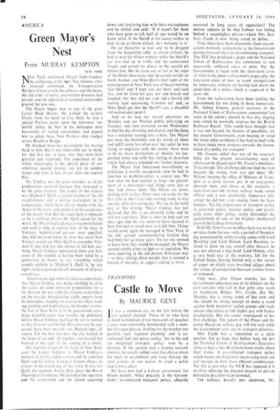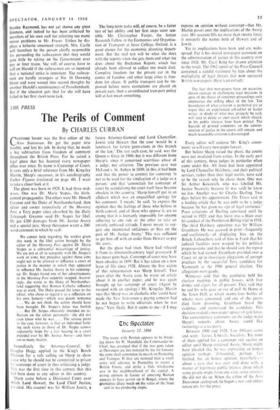TRANSPORT
Castle to Move
By MAURICE GENT
IT was a common cry on the left before the last general election. Those of us who have to listen to hundreds if not thousands of speeches a year were constantly bombarded with a num- ber of vogue phrases. Jostling for the number one position were 'regional planning' and 'a co- ordinated fuel and power policy,' but in the end 'an integrated transport policy' won by a distance. If the speaker had a leaning towards rhetoric, he usually added some fine phrase about the need to co-ordinate and keep flowing the vital arteries of our nation. It rated a polite clap if not a cheer.
We have now had a Labour government for fifteen months. What precisely is the Govern- ment's co-ordinated transport policy, allegedly nurtured in long years of opposition? The answer appears to be that Labour was hiding behind a meaningless phrase—which Mrs. Bar- bara Castle is now being asked to define.
True, there have been documents from organi- sations normally sympathetic to the Government putting forward ideas on co-ordinating transport. The TUC has produced a paper and the National Union of Railwaymen has committed its not necessarily unbiased views to print. Yet the Government is faced with the short-term crisis of what to do about railwaymen's wages. plus the long-term crisis of how to avoid strangulation by motor-car, without yet having laid down the guide-lines of a policy which is supposed to be years old.
Even the railwaymen have been chiding the Government for not doing its basic homework. Mr. Sidney Greene, general secretary of the National Union of Railwaymen, commented last week in his union's journal in that dry, digging tone which he normally reserves for the British Railways Board: 'One would have thought that it was not beyond the bounds of possibility for the present Government, even bearing in mind the many other problems it has had to deal with, to have made more progress towards the formu- lation of a policy for transport.'
Mr. Greene added that not all the responsi- bility for the present unsatisfactory state of affairs can be placed upon Mr. Fraser's shoulders. True enough. The challenge did not find the man because the wrong man was put there. Mr. Wilson, treating the office of Minister of Trans- port as a party favour, put in an easy-going, pleasant man, and chose as his assistants a sixty-four-year-old former railway trade union official and a not abundantly impressive left- winger he did not want sniping from the back benches. Yet the importance of transport policy to economic policy, incomes policy, and practi- cally every other policy, surely demanded the appointment of one of the brighter intellectual stars in the Labour firmament.
With Mr. Tom Fraser in office, there was no lead on ideas from the top—only a period of flounder- ing punctuated by embarrassing scenes with Lord Beeching and Lord Hinton. Lord Beechin.g re- fused to draw up any overall plan because he was not allowed a free hand. Lord Hinton, after a very brief stay at the ministry, left for the United States, leaving behind only a few scraps of paper on which were inscribed adages about the virtues of competition between various forms of transport.
Only now, after fifteen months, has the Government unleashed one of its thinkers on the civil servants who toil in that grim area south of Southwark Bridge. Mrs. Castle, like Mr. Marples, has a strong mind of her own and she should be strong enough to make a stand against both motorists' action groups and trade unions who refuse to link higher pay with higher productivity. But she comes unprepared to her first challenge. The report of the Prices and In- comes Board on railway pay will not wait while the Government sorts out its transport priorities.
Mrs. Castle has a reputation as a plain speaker. Let us hope that before long she has the National Union of Railwaymen's Executive along to hear a few Blackburn home truths about liner trains. A co-ordinated transport policy which means anything must mean using road and rail services in their most efficient combination. Yet this is just what the NUR has opposed if it involves allowing the dreaded dragon of private enterprise in a liner-train terminal.
The railways board's new chairman, Mr. Stanley Raymond, has not yet shown any great firmness, and indeed he has been criticised by members of his own staff for referring too many minor problems to Mr. Fraser. Unless he dis- plays a hitherto unnoticed strength, Mrs. Castle will therefore be the person chiefly responsible for persuading the railwaymen that they would gain little by taking on the Government over pay or liner trains. She will, of course, have to call on Harold if the railwaymen are so incensed that a national strike is imminent. The railway- men are hardly strangers at No. 10 Downing Street and were wooed into second thoughts by another Harold's reminiscences of Passchendaele. But if the situation gets that far she will have failed in her first short-term task. The long-term tasks will, of course, be a fairer test of her ability and her first steps seem sen- sible. Mr. Christopher Foster, the Senior Research Fellow in the Economics and Organisa- tion of Transport at Jesus College, Oxford, is a good choice for the economic planning depart- ment. But the real test will be what she does with the reports when she gets them and what she does about the Buchanan Report, which has already been allowed to collect too much dust Complete freedom for the private car in the centre of London and other large cities is free- dom for chaos. If public transport can be im- proved before more restrictions are placed on private cars, then a co-ordinated transport policy will at last mean something.



































 Previous page
Previous page